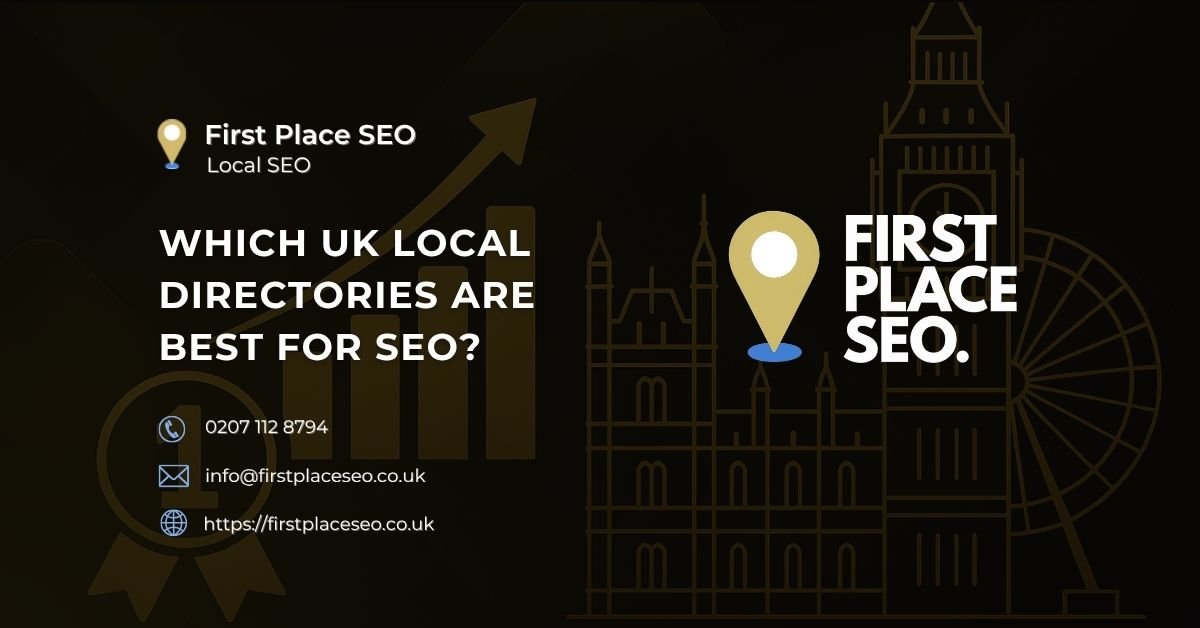Which local directories are essential for SEO success in the UK in 2025?
Local directories are important for helping people find your business when they search online for something nearby. Whether it’s someone looking for a SEO company in London or a Google Ads Specialist in the UK, being listed in the right places makes a big difference. These listings help your business show up on Google Maps, in the local search results, and even on apps and devices that pull location data. The information in your directory listings needs to match up everywhere such as your business name, phone number and address. When it does, it gives search engines more confidence in your business and helps you show up more often.
Here's What We Have Covered In This Article
Introduction: The Growing Importance of Local SEO for UK Businesses
What Is Local SEO and Why It Matters in 2025
Local SEO is simply about helping people near your business find you online. It’s the reason your bakery shows up when someone searches for fresh bread near me in Newcastle or why your web design agency in London appears when someone searches for website builders in my area. The way Google and other search engines decide which businesses to show relies heavily on signals from local directories. These are websites and platforms where your business information lives such as Google Business Profile, Apple Maps, Yell.com and others.
Search engines cross-check this information across the web. When it all lines up, they’re more likely to trust your business and show it in results. Discrepancies can cause search engines to lose confidence and lower your visibility. With more people using voice search, mobile phones and in-car systems to find local services, making sure your details are in the right places is a practical way to stay competitive.
The Role of Local Citations and Business Directories
A citation is any online mention of your business name, address and phone number, often referred to as NAP. These mentions show up on local directory websites, apps, review platforms and social media profiles. In the UK, trusted citation sources include Google.co.uk, Facebook, Apple Maps, BT The Phone Book, Yell.com and Yelp.co.uk.
Having listings on these platforms improves how your business is seen by search engines. Search algorithms use structured data from citation sources to determine your location, industry relevance and credibility. The more consistent and complete your citations are, the better your chances of appearing in local results. A business with well-managed citations will usually outperform a competitor with inconsistent or missing entries, even if both offer the same services.
Impact of Local Listings on Google’s Local Pack and Maps Rankings
When someone searches for a nearby service, Google often displays a Local Pack. This is the boxed section at the top of the search results with a map and three highlighted businesses. Being included here can lead to more enquiries, more visits and higher conversions. To qualify, your business needs strong location signals, consistent information, positive sentiment in reviews and well-maintained listings.
Google Business Profile, Apple Maps and Bing Places are primary sources of location data for the Local Pack. Search engines also pull structured citation data from sources like Yell.com, ThePhoneBook.bt.com and 192.com. If your information is inconsistent or missing on these, it can reduce your visibility.
Other platforms like TomTom, Garmin and Waze also use citation data, which extends your visibility to users relying on satellite navigation and map apps. These integrations allow your business details to appear across a wide range of connected services, which improves visibility in ways that go beyond the Google search page
Improve Your Local Search Rankings
Let First Place SEO optimise your listings across every UK directory.
UK-Specific High-DA Local Directories Worth Prioritising
Which UK directories offer the strongest authority signals for local SEO?
Some local directories have more weight than others in search engine optimisation. Domain authority plays a role in how much trust a citation can pass. For UK businesses, there are several platforms with high authority and strong local relevance.
Yell.com and Yelp.co.uk are two of the most recognised citation sources. While Yelp has a stronger reputation in some sectors like hospitality and home services, Yell remains one of the largest directories focused on UK businesses. Listings here feed into search engine trust signals and also provide potential customers with contact details, reviews and opening times.
ThePhoneBook.bt.com is often overlooked but holds high domain authority. It has long been a trusted source of verified business data in the UK. Inclusion here is useful for location relevance and supporting consistent NAP data. Similarly, 192.com and Thomsonlocal.com are valuable additions. They not only add citation depth but also appear directly in search results, increasing chances for user engagement.
Directory listings hosted on news platforms such as Directory.Thesun.co.uk, Directory.Mirror.co.uk, Directory.Independent.co.uk and Local.Standard.co.uk carry additional weight. These platforms are trusted media brands, and citations here can influence search engine assessments of brand trust. Listings on WalesOnline.co.uk and Directory.DailyRecord.co.uk work similarly, providing location-specific trust signals.
Most Overlooked But Valuable UK Citation Sites
Where else should UK businesses list to improve SEO and visibility?
Beyond the well-known directories, there are several UK platforms that are often missed but still offer SEO benefits. JustLanded.com, GB.Kompass.com and Infobel.com are useful for B2B companies, manufacturers and international service providers. These sites help establish business legitimacy across different industries.
FreeIndex.co.uk and TheBestOf.co.uk are platforms where smaller businesses often gain visibility, particularly when they are reviewed well. They also allow for keyword-rich descriptions and categories, helping search engines better understand your services. Bark.com is another citation source that pairs directory listings with lead generation, making it useful for service providers.
Sites like CentralIndex.com, Cylex-UK.co.uk and BrownBook.net support business discovery in regional search results. They distribute citation data to smaller apps and business platforms, increasing reach. While they may not be as widely known, they help with building citation volume, which remains a local SEO ranking factor.
Having consistent citations across multiple data sources improves confidence in your business information. It also improves your chances of appearing in search for less competitive longtail keywords, such as best garden landscaping in Stockport or emergency locksmith in Croydon. These search queries often pull results from niche directories where your competitors may not be listed.
Industry-Specific Directories for UK Businesses
Where should UK businesses list based on their industry?
Some directories are built specifically for particular trades, professions or sectors. These can provide added trust and relevance signals to search engines while helping you reach the right customers.
For local trades like plumbing, roofing and carpentry, directories such as Checkatrade, TrustATrader and Rated People are well-known and trusted by homeowners across the UK. These sites offer more than just listings. They include verified reviews and business vetting, which supports credibility and conversion.
In the health sector, platforms like Doctify, WhatClinic and TopDoctors are useful for clinics, dentists, physiotherapists and GPs. They offer profile features that align with Google’s quality guidelines such as structured medical schema, verified practitioner information and service categorisation.
For legal professionals, Avvo UK and The Law Society Directory allow solicitors and firms to list their services with credibility. These listings often show up for informational queries such as find a divorce lawyer in Birmingham or legal advice for tenants in Glasgow.
Hospitality and food businesses can benefit from platforms like OpenTable UK, Zomato UK and Tripadvisor. These listings can include rich data such as menus, booking availability and customer photos. Reviews on these platforms are also indexed and sometimes shown in search snippets, helping improve engagement and trust.
Geo-Targeted and Regional Directories
Do regional directories still help with search rankings?
Regional directories are especially useful for businesses that rely on a local catchment area. Listings on sites such as MyLocalServices.co.uk, UKSmallBusinessDirectory.co.uk and CityLocal.co.uk signal your relevance to specific towns or boroughs. These platforms often support postcode level targeting and regional filters, which helps in targeting users based on location proximity.
Directories connected to local media, councils or community organisations also carry weight. Being listed in your town’s Chamber of Commerce or on a Local Enterprise Partnership (LEP) website reinforces credibility. These links are considered trustworthy and often appear naturally in local content and press coverage.
Businesses that serve tourists or local shoppers may also benefit from appearing in directories like VisitScotland, VisitWales or city-specific tourism websites. These often include categories like where to eat, where to shop and what to do, which supports both search visibility and foot traffic.
Review Platforms That Enhance Local SEO
Reviews are a ranking factor and influence click through rates. Positive reviews also influence buying decisions. Sites like Trustpilot, Reviews.co.uk and Feefo are widely used in the UK. They allow structured schema markup and often appear with star ratings in search results. Google also pulls review snippets into your Business Profile if these platforms are linked and verified.
Facebook and Google reviews help directly with map visibility. They are also indexed in organic search. Encouraging customers to leave genuine feedback, replying to reviews and resolving complaints all help show engagement. It supports positive sentiment signals which Google considers when deciding local rankings.
Sector-specific review platforms like Doctify or Checkatrade give you credibility within your field. Many of these platforms allow keyword-rich content, service menus and media uploads. This gives search engines more signals to understand what you do and who you serve.
How to Optimise UK Directory Listings
To get the most out of local citations, listings should be accurate, consistent and complete. Your business name, address and phone number should be the same across every platform. Even small differences in punctuation or formatting can weaken trust signals.
Always fill out every available field in your directory profiles. This includes descriptions, opening hours, payment options, services, and photos. Use keywords that reflect what your customers are searching for, but keep the tone natural. Avoid keyword stuffing or writing only for algorithms.
Choose the most relevant business categories and subcategories. These help platforms understand what your business offers. Uploading high-quality images of your premises, staff or products also builds credibility. Regularly update your listings, especially if your business changes location, hours or services.
Structured Data and Schema
Structured data helps search engines read your business information clearly. By using LocalBusiness schema on your website, you can reinforce the information listed in directories. This improves your eligibility for rich results and local panel features.
Review markup, opening hours, social profile links and business type attributes can all be added to your website code. This should match the data in your directories. It increases consistency and strengthens the signals sent to search engines.
Schema markup is especially helpful for mobile and voice searches, where context is essential. It helps digital assistants like Alexa and Siri read your business details more reliably.




